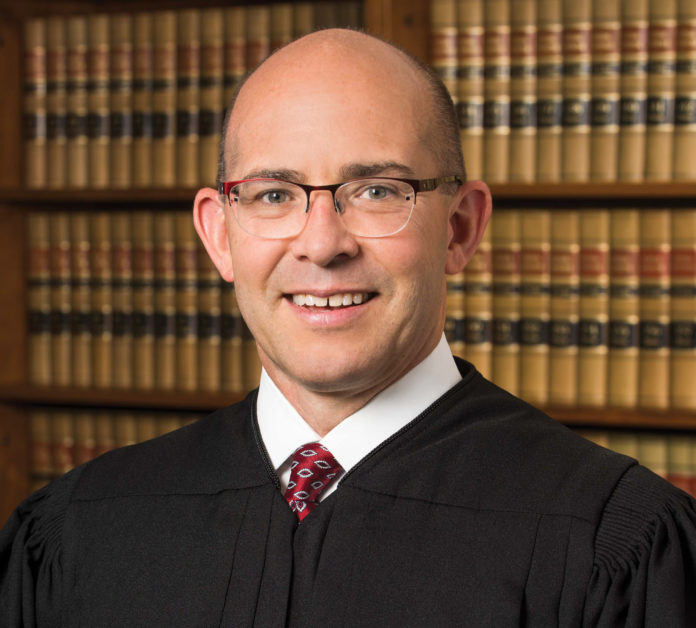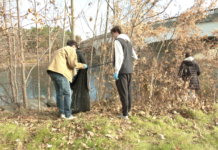FarmHouse Fraternity alumnus Brian Fenimore (Missouri 85) is a Federal United States Bankruptcy Judge for the Western District of Missouri. Drawn to farming, Brian began college with the intention of earning a degree in agriculture. At the University of Missouri, Brian joined FarmHouse and quickly took advantage of the opportunities presented to him. During his undergraduate years, his life took a turn when Ray Schweizer (Missouri 85) convinced Brian to take an entrance exam to law school with him. Passing the exam earned Brian admission to the University of Michigan School Law. He practiced for Lathrop Gage LLP for a number of years. Today, Brian lives with his wife, Lorna, and two kids in Kansas City, Mo.
Why do you do what you do?
When I was a practicing lawyer, my challenge every day was to solve people’s problems, and I really enjoyed it. Every client and case presented a different scenario, a different challenge and opportunity. Now, as a judge, I am not solving any one party’s issues, but I am getting to the right result under the law. This is even more challenging because you have to think on both sides of the situation and see how it fits into the structure of the law. It is a new challenge every day and I like that. Each case brings its own set of focuses and problems.
What advice has stayed with you over time?
From the service aspect, the advice I always remember and adhere to is when agreeing to devote your talents and your time to various service opportunities you have to be careful to not overextend yourself and to try to focus on the things about which you are the most passionate. Those are the things you are going to try to dive in to and work hard to resolve. Pick the things you are passionate about and don’t overextend yourself. If you overextend yourself you’re trying to do too many things and you won’t do anything right or won’t do as well as you can.
What have you enjoyed the most in your professional career?
As a United States Judge, I have the opportunity to preside over naturalization ceremonies. These are the ceremonies where individuals from other countries have completed the process and become United States citizens. Presiding over these ceremonies is a wonderful feeling. The courtroom is full of happy people. Every month we usually have ceremonies for 100–150 new U.S. citizens and sometimes we will have an additional special ceremony. I sign up for those as often as I can. It is such a great feeling and puts a whole new perspective on what it is to live in a free country. Getting to administer the oath to these people and welcome them as new brothers and sisters of our country is a very rewarding experience. I would highly encourage anyone who has an opportunity to watch one of these ceremonies to do so, they are open to the public.
What does service mean to you?
I believe service is about making our little piece of the world better—a better place to raise our families and for others to raise their families. When you have done that locally, then you can take it out farther to the rest of the world. It is about taking care of those around you but not forgetting about people in other parts of the world who are less fortunate.
Do you have a personal philosophy?
First, lead by example. It goes back to FarmHouse for me when the executive team asked me to get involved. We all challenged each other to be involved in campus activities that appealed to us and get involved with service organizations. That is where it all started for me—to challenge us to think about what we had a passion for and to take advantage of other opportunities and passions. My second philosophy is if you are the best one for the job, do it. If you are not, then talk to the person who is into doing it.
How do you approach challenges when they come your way?
My approach to dealing with challenges is to view them as opportunities. Sometimes it is an opportunity to right the wrong or to steer the ship in the right direction. Oftentimes the challenges are complex and so I usually break it up into small pieces. You cannot solve all the problems in one fell swoop so you have to handle them incrementally and hope you have them in the right order.
How has FarmHouse impacted your career?
FarmHouse really helped give me direction because I immediately had 60-80 brothers and mentors who looked out for me. They were willing to give me advice, constructive criticism and be there when I needed them. They served as an example and a catalyst to get involved with service and think about more meaningful things to do with my future. I owe it to my FarmHouse brothers for getting me on my career path. It changed my life, literally, in that respect. I readily recall reciting the Object every Monday night at chapter and I think about how there are no wasted words in the Object. I am amazed at how well written it is and the scope of coverage it has. I focus on the promise to give service to fellow men and to the world. That is really the beginning of how I began to think of service.






















